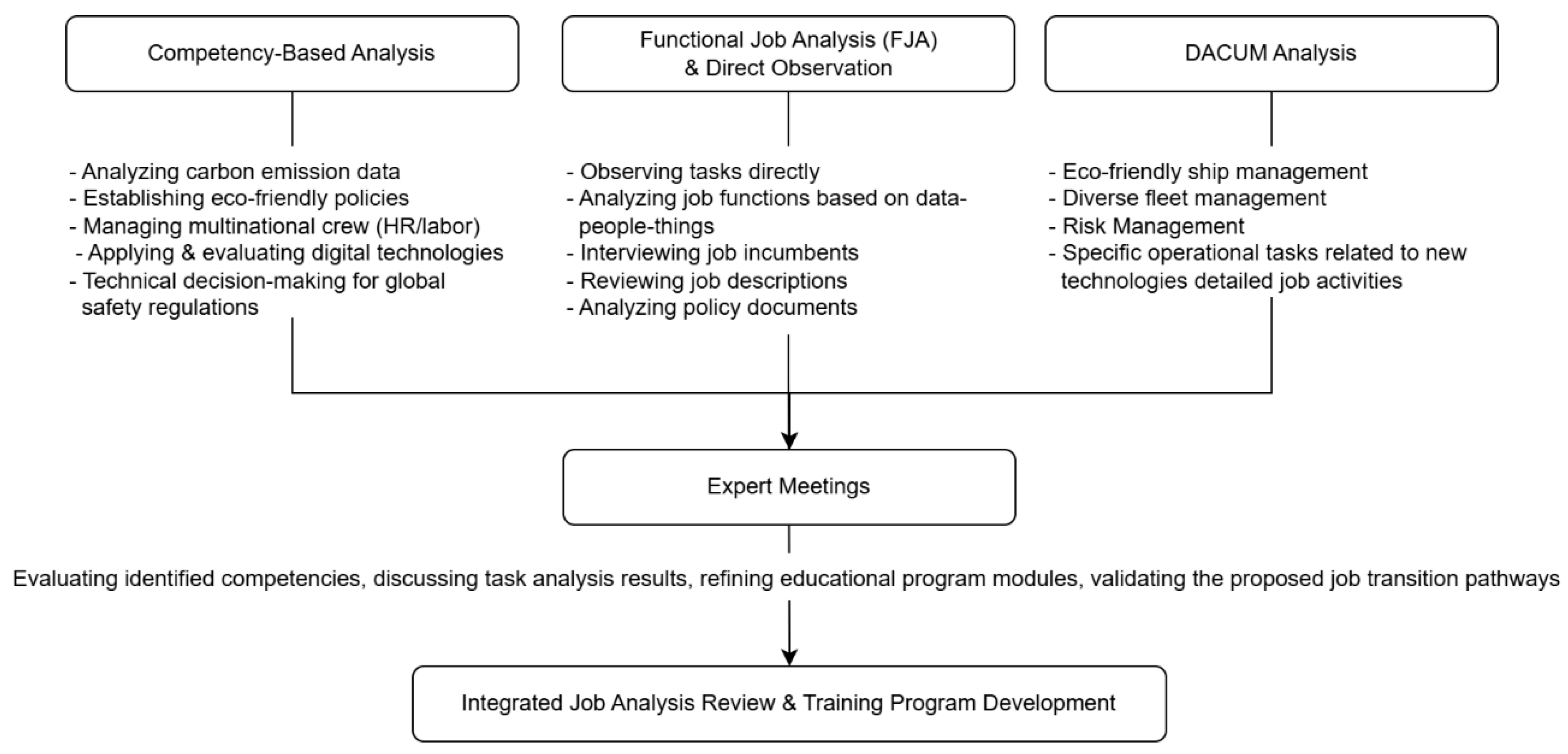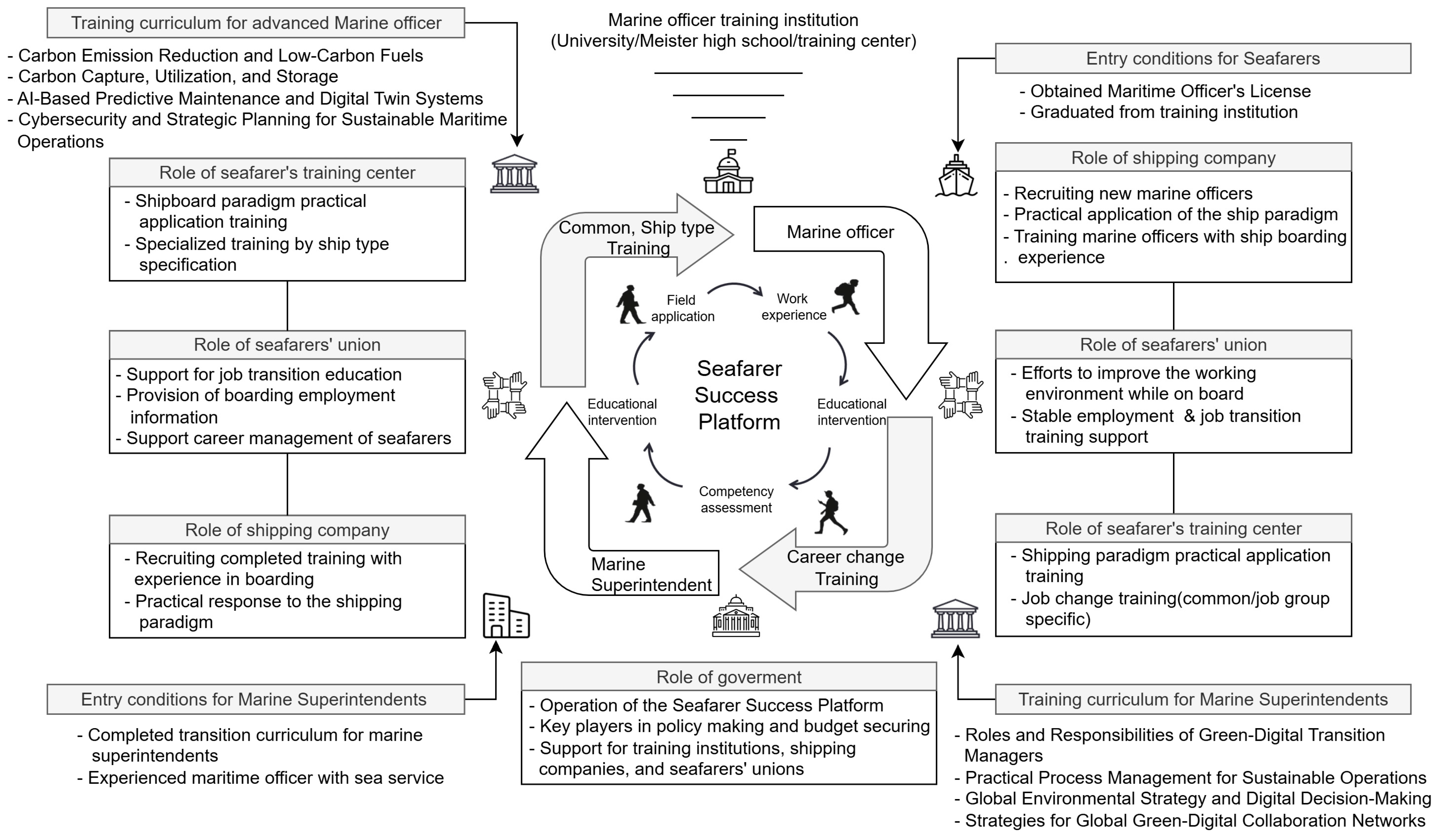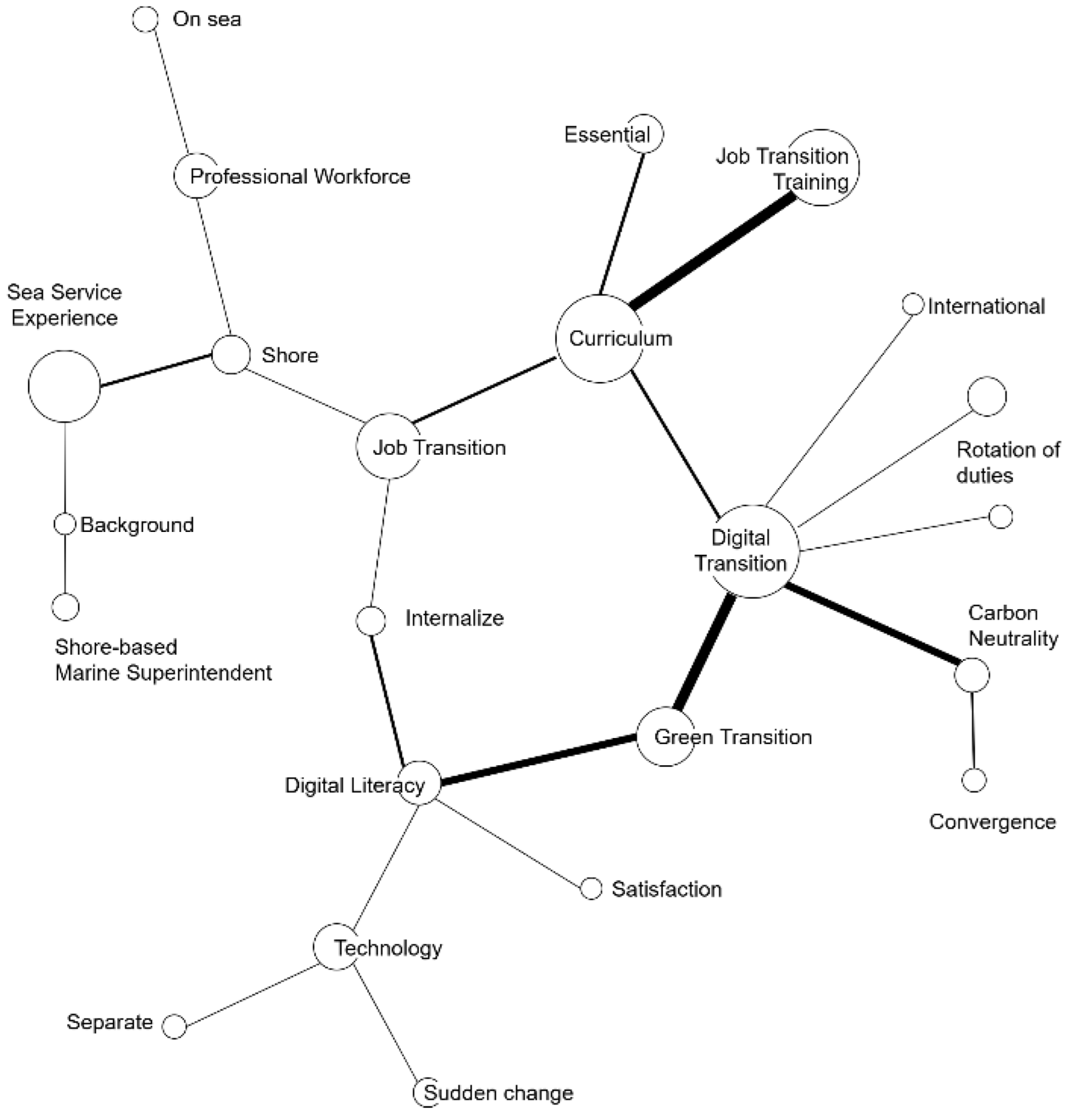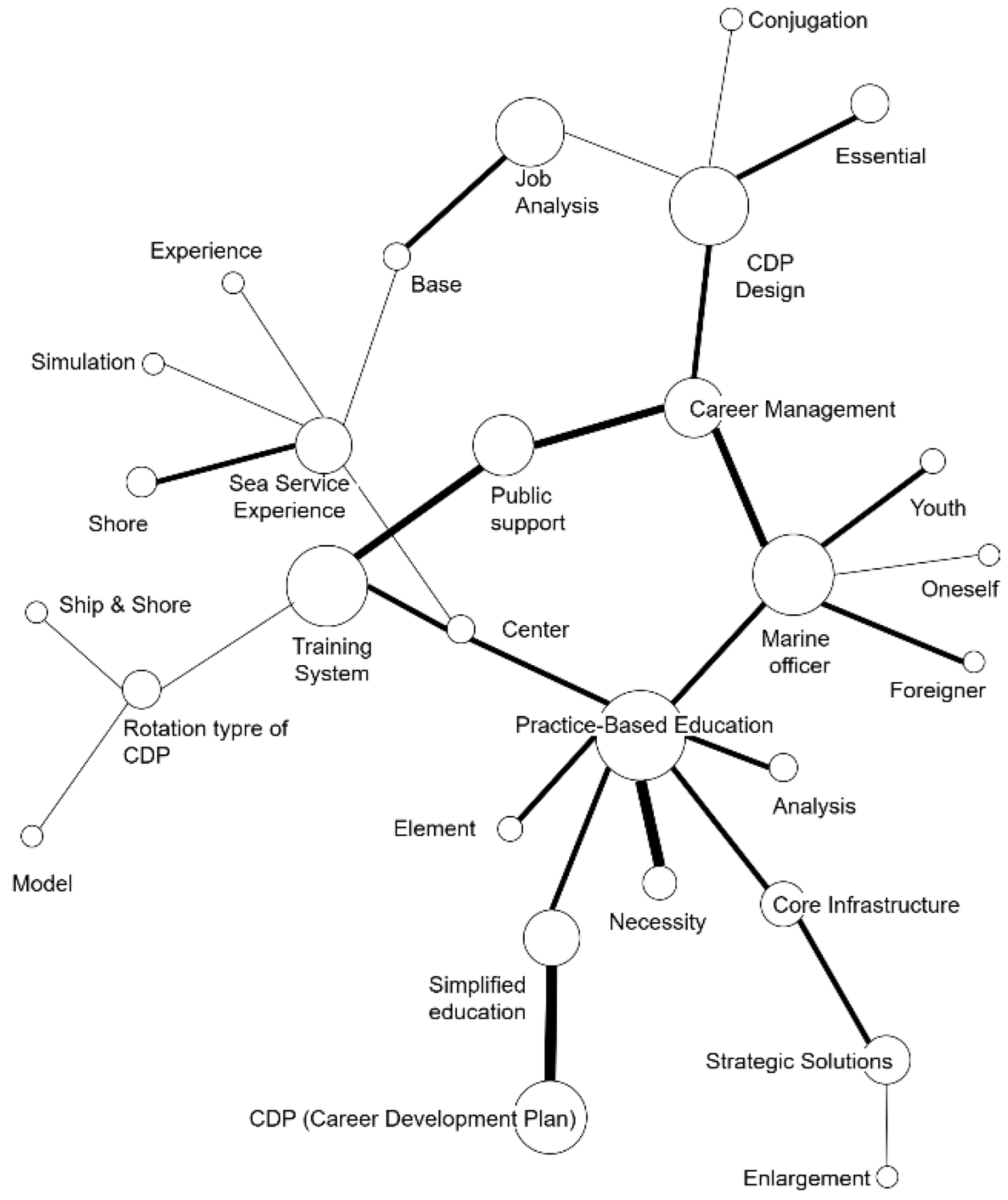Developing a Competency-Based Transition Education Framework for Marine Superintendents: A DACUM-Integrated Approach in the Context of Eco-Digital Maritime Transformation
Abstract
1. Introduction
1.1. Background of the Study
1.2. Objectives of the Study
2. Literature Review
2.1. The Eco-Digital Transformation of the Maritime Industry
2.2. Seafarer Career Transition and Competency Gaps
2.3. Competency-Based Approaches in Maritime Education and Training
3. Framework and Methodology
3.1. Concept and Classification of Job Analysis
3.2. Curriculum Design Based on John Dewey’s Theory of Experience
3.3. Research Methodology
4. Results
4.1. Identification of Core Competencies for Shore-Based Ship Superintendents
4.2. Analysis of Seafarers Transitioning to Shore-Based Superintendent Roles
4.3. Expert Consultation-Based Competency and Job Analysis: A Keyword Network Approach
4.4. Transition Curriculum for Marine Superintendents
Design of a Common (Foundational) Curriculum for Shore-Based Marine Superintendents
5. Discussion
6. Conclusions
- Empirical assessments of the proposed curricula;
- Comparative international studies;
- An in-depth exploration of the design and institutionalization of the proposed Seafarer Success Support Platform.
Author Contributions
Funding
Institutional Review Board Statement
Informed Consent Statement
Data Availability Statement
Acknowledgments
Conflicts of Interest
References
- Chen, J.; Zhang, X.; Xu, L.; Xu, J. Trends of Digitalization, Intelligence and Greening of Global Shipping Industry Based on CiteSpace Knowledge Graph. Ocean Coast. Manag. 2024, 255, 107206. [Google Scholar] [CrossRef]
- Minh, T.T.N.; Hoang, H.-T.H.; Nam, H.S.; Alamoush, A.S.; Duong, P.A. Revisiting Port Decarbonization for Advancing a Sustainable Maritime Industry: Insights from Bibliometric Review. Sustainability 2025, 17, 4302. [Google Scholar] [CrossRef]
- Xiao, G.; Wang, Y.; Wu, R.; Li, J.; Cai, Z. Sustainable Maritime Transport: A Review of Intelligent Shipping Technology and Green Port Construction Applications. J. Mar. Sci. Eng. 2024, 12, 1728. [Google Scholar] [CrossRef]
- Maritime Safety Committee. (IMO MSC 105), 20–29 April 2022. Available online: https://www.imo.org/en/MediaCentre/MeetingSummaries/Pages/MSC-105th-session.aspx (accessed on 14 June 2025).
- Wang, C.; Peng, Z.; Yang, J.; Zhang, N.; Li, K.; Li, X. Optimal Alternative Fuel Selection for Dual-Fuel Ships Under FuelEU Maritime Regulations: Environmental and Economic Assessment. J. Mar. Sci. Eng. 2025, 13, 1105. [Google Scholar] [CrossRef]
- Pettit, S.J.; Gardner, B.M.; Marlow, P.B.; Naim, M.M.; Nair, R. Ex-Seafarers Shore-Based Employment: The Current UK Situation. Mar. Policy 2005, 29, 521–531. [Google Scholar] [CrossRef]
- Durlik, I.; Miller, T.; Kostecka, E.; Łobodzińska, A.; Kostecki, T. Harnessing AI for Sustainable Shipping and Green Ports: Challenges and Opportunities. Appl. Sci. 2024, 14, 5994. [Google Scholar] [CrossRef]
- Maghoromi, B.E. Impact of Emerging Technologies on Maritime Education and Training: A Phenomenological Study; World Maritime University: Malmö, Sweden, 2023; Available online: https://commons.wmu.se/cgi/viewcontent.cgi?article=3256&context=all_dissertations (accessed on 14 June 2025).
- Mi, J.J.; Wang, Y.; Zhang, N.; Zhang, C.; Ge, J. A Bibliometric Analysis of Green Shipping: Research Progress and Challenges for Sustainable Maritime Transport. J. Mar. Sci. Eng. 2024, 12, 1787. [Google Scholar] [CrossRef]
- Duffey, R.B.; Saull, J.W. Managing Risk: The Human Element; John Wiley & Sons Limited: Chichester, UK, 2008. [Google Scholar] [CrossRef]
- Kitada, M.; Ölçer, A. Managing People and Technology: The Challenges in CSR and Energy Efficient Shipping. Res. Transp. Bus. Manag. 2015, 17, 36–40. [Google Scholar] [CrossRef]
- Ölçer, A.I.; Kitada, M.; Lagdami, K.; Ballini, F.; Alamoush, A.S.; Masodzadeh, P.G. (Eds.) Transport 2040: Impact of Technology on Seafarers—The Future of Work; World Maritime University: Malmö, Sweden, 2023; Available online: https://commons.wmu.se/cgi/viewcontent.cgi?article=1091&context=lib_reports (accessed on 14 June 2025).
- Dimitranov, D.; Belev, B. Sustainable Shipping Requires Sustainable Education and Training. Sustainability 2024, 16, 11270. [Google Scholar] [CrossRef]
- Emad, G.R.; Ghosh, S. Identifying Essential Skills and Competencies Towards Building a Training Framework for Future Operators of Autonomous Ships: A Qualitative Study. WMU J. Marit. Aff. 2023, 22, 427–445. [Google Scholar] [CrossRef]
- Kulik, A.A.; Lazareva, P.V.; Ippolitova, N.V.; Egorova, A.E.; Nedorezova, O.Y. Competency-Based Approach and Competencies in Higher Education: A Theoretical Review. Propósitos Y Represent. 2020, 8, e645. [Google Scholar] [CrossRef]
- Sun, J. Competency Model. In The ECPH Encyclopedia of Psychology; Springer: Singapore, 2024; p. 1. [Google Scholar] [CrossRef]
- Dewan, M.H.; Yaakob, O.; Suzana, A. Barriers for Adoption of Energy Efficiency Operational Measures in Shipping Industry. WMU J. Marit. Aff. 2018, 17, 169–193. [Google Scholar] [CrossRef]
- Dewan, M.H.; Godina, R. Roles and Challenges of Seafarers for Implementation of Energy Efficiency Operational Measures Onboard Ships. Mar. Policy Rev. 2023, 155, 105746. [Google Scholar] [CrossRef]
- Baum-Talmor, P.; Kitada, M. Industry 4.0 in Shipping: Implications to Seafarers’ Skills and Training. Transp. Res. Interdiscip. Perspect. 2022, 13, 100542. [Google Scholar] [CrossRef]
- Barnett, M.; Gatfield, D.; Overgaard, B.; Pekcan, C.; Graveson, A. Barriers to Progress or Windows of Opportunity? A Study in Career Path Mapping in the Maritime Industries. WMU J. Marit. Aff. 2006, 5, 127–142. [Google Scholar] [CrossRef]
- Theotokas, I.N.; Lagoudis, I.N.; Raftopoulou, K. Challenges of Maritime Human Resource Management for the Transition to Shipping Digitalization. J. Shipp. Trade 2024, 9, 6. [Google Scholar] [CrossRef]
- Mitra, N.; Mazumdar, M. Competency-Based Approaches in Education; Kunal Books: New Delhi, India, 2024; Available online: https://www.researchgate.net/publication/391565870_Competency-Based_Approaches_in_Education (accessed on 1 June 2025).
- Ghosh, S.; Emad, G.R.; Ravi, A. Investigating the Characteristics of Skills and Competency Frameworks Through a Systematic Literature Review: A Feasibility Study to Revise the STCW Code for Seafarer Training. Aust. J. Marit. Ocean. Aff. 2024, 1–17. [Google Scholar] [CrossRef]
- Matthew, J. Competency Frameworks; Thomas: Marlow, UK, 2023; Available online: https://www.thomas.co/resources/type/hr-guides/competency-frameworks (accessed on 7 January 2024).
- Demirel, E. Maritime Education and Training in the Digital Era. Univers. J. Educ. Res. 2020, 8, 4129–4142. [Google Scholar] [CrossRef]
- Stemmler, L. Shipping and a “Great Transformation”—Some Remarks for a New Sustainability Paradigm. Sustain. Manag. Forum|Nachhalt. 2020, 28, 29–37. [Google Scholar] [CrossRef]
- Oswald, F.L. Job Analysis: Methods, Research, and Applications for Human Resource Management in the New Millennium. Pers. Psychol. 2003, 56, 800–802. [Google Scholar]
- Siddique, C.M. Job Analysis: A Strategic Human Resource Management Practice. Int. J. Hum. Resour. Manag. 2004, 15, 219–244. [Google Scholar] [CrossRef]
- Singh, P. Job Analysis for a Changing Workplace. Hum. Resour. Manag. Rev. 2008, 18, 87–99. [Google Scholar] [CrossRef]
- Stevens, G.W. A Critical Review of the Science and Practice of Competency Modeling. Hum. Resour. Dev. Rev. 2013, 12, 86–107. [Google Scholar] [CrossRef]
- Cicek, K.; Akyuz, E.; Celik, M. Future Skills Requirements Analysis in Maritime Industry. Procedia Comput. Sci. 2019, 158, 270–274. [Google Scholar] [CrossRef]
- Shahbakhsh, M.; Emad, G.R.; Cahoon, S. Industrial Revolutions and Transition of the Maritime Industry: The Case of Seafarer’s Role in Autonomous Shipping. Asian J. Shipp. Logist. 2022, 38, 10–18. [Google Scholar] [CrossRef]
- Wang, H.; Yu, S.; Chen, D.; Xiao, J. Mission-Oriented Situation Awareness Information Requirements of Submariners: A Goal Directed Task Analysis. Ocean Eng. 2024, 299, 117200. [Google Scholar] [CrossRef]
- Manuel, M.E. Vocational and Academic Approaches to Maritime Education and Training (MET): Trends, Challenges and Opportunities. WMU J. Marit. Aff. 2017, 16, 473–483. [Google Scholar] [CrossRef]
- Benayoune, A.; Al Farsi, S.; Mcdaid, M.P.; Palanivelu, R.K.; Colak, A.T.I.; Issa-Zadeh, S.B. Balancing Vocational and Academic Approaches in Maritime Education and Training: A Case Study; Charting the Future of Maritime Excellence: Chennai, India, 2024. [Google Scholar] [CrossRef]
- Fei, J. Managing Human Resources in the Shipping Industry; Routledge: Abingdon, UK, 2018. [Google Scholar]
- Kim, M.; Joung, T.-H.; Jeong, B.; Park, H.-S. Autonomous Shipping and Its Impact on Regulations, Technologies, and Industries. J. Int. Marit. Saf. Environ. Aff. Shipp. 2020, 4, 17–25. [Google Scholar] [CrossRef]
- Tang, L.; Zhang, P. Human Resource Management in Shipping: Issues, Challenges, and Solutions; Routledge: Abingdon, UK, 2021. [Google Scholar] [CrossRef]
- Caesar, L.D. Emerging Dynamics of Training, Recruiting and Retaining a Sustainable Maritime Workforce: A Skill Resilience Framework. Sustainability 2023, 16, 239. [Google Scholar] [CrossRef]
- Streng, M.; Kuipers, B. Economic, Social, and Environmental Impacts of Autonomous Shipping Strategies. In Maritime Supply Chains; Vanelslander, T., Sys, C., Eds.; Elsevier: Amsterdam, The Netherlands, 2020; pp. 135–145. [Google Scholar] [CrossRef]
- Berding, J.W.A. Towards a Flexible Curriculum: John Dewey’s Theory of Experience and Learning. Educ. Cult. 1997, 14, 24–31. [Google Scholar]
- Hanh, T.T.J. Dewey’s Philosophy of Considering Education as Life Itself and the Evocative Value for Vietnamese Education Today. Kalagatos 2024, 21, eK24041. [Google Scholar]
- Mori, Y.; Manuel, M.E. An Exploration of the Theoretical Foundations of Onboard Seafarer Training: A Systematic Review of the Literature. Trans. Nav. Int. J. Mar. Navig. Saf. Sea Transp. 2023, 17, 913–928. [Google Scholar] [CrossRef]
- Sariti, D. Teaching Effective & Creative Practice Habits. Am. String Teach. 2024, 54, 98–102. [Google Scholar] [CrossRef]
- Daff, L.; Tame, C.; Sands, J. A Course Design Approach That Encourages Reflective Practice Habits. Int. J. Manag. Educ. 2024, 22, 100990. [Google Scholar] [CrossRef]
- Narayanan, S.C.; Emad, G.R.; Fei, J. Theorizing Seafarers’ Participation and Learning in an Evolving Maritime Workplace: An Activity Theory Perspective. WMU J. Marit. Aff. 2023, 22, 165–180. [Google Scholar] [CrossRef]
- International Maritime Organization (IMO). International Convention on Standards of Training, Certification, and Watchkeeping for Seafarers (STCW); IMO: London, UK, 1987; Available online: https://www.imo.org/en/OurWork/HumanElement/Pages/STCW-Convention.aspx#:~:text=The%20International%20Convention%20on%20Stanards%20of%20Training%2C%20Certification,Convention%20entered%20into%20force%20on%2028%20April%201984 (accessed on 14 June 2025).
- Dewan, M.H.; Mustafi, M.A.A.; Matos, F.; Godina, R. Exploring Seafarers’ Knowledge, Understanding, and Proficiency in SEEMP: A Strategic Training Framework for Enhancing Seafarers’ Competence in Energy-Efficient Ship Operations. Heliyon 2024, 10, e36505. [Google Scholar] [CrossRef]
- Ashry, T.A.; Nasr, N.A.; Fahim, N.S.; Marey, N.A. A Field Study Onboard VLCCs for CO2 Emission Reduction Considering EEDI and SEEMP. Alex. Eng. J. 2024, 108, 662–675. [Google Scholar] [CrossRef]
- Dewan, M.H.; Godina, R. Unveiling Seafarers’ Awareness and Knowledge on Energy-Efficient and Low-Carbon Shipping: A Decade of IMO Regulation Enforcement. Mar. Policy 2024, 161, 106037. [Google Scholar] [CrossRef]
- Dewan, M.H.; Godina, R. An Overview of Seafarers’ Engagement and Training on Energy Efficient Operation of Ships. Mar. Policy 2024, 160, 105980. [Google Scholar] [CrossRef]
- Sparrow, P.R. Transitions in Work: Organizational and Individual Perspectives; Oxford University Press: Oxford, UK, 1996. [Google Scholar] [CrossRef]
- Arribas-Aguila, D.; Castaño, G.; Martínez-Arias, R. A Systematic Review of Evidence-Based General Competency Models: Development of a General Competencies Taxonomy. J. Work Organ. Psychol. 2024, 40, 61–76. [Google Scholar] [CrossRef]
- Cardy, R.L.; Selvarajan, T. Competencies: Alternative Frameworks for Competitive Advantage. Bus. Horiz. 2006, 49, 235–245. [Google Scholar] [CrossRef]
- Almeida, D.V.; Kolinjivadi, V.; Ferrando, T.; Roy, B.; Herrera, H.; Gonçalves, M.V.; Van Hecken, G. The ‘Greening’ of Empire: The European Green Deal as the EU First Agenda. Political Geogr. 2023, 105, 102925. [Google Scholar] [CrossRef]
- Landis, J.R.; Koch, G.G. The measurement of observer agreement for categorical data. Biometrics 1977, 33, 159–174. [Google Scholar] [CrossRef] [PubMed]
- NetMiner. Cyram Inc. 2017. Available online: http://www.netminer.com/download_buy/download/download-readList.do (accessed on 14 June 2025).
- International Labour Organization (ILO). Maritime Labour Convention (MLC); International Labour Organization (ILO): Geneva, Switzerland, 2006. [Google Scholar]


| Definition | Key Components | |
|---|---|---|
| Core Competency | Basic competencies commonly required across all ship operation-related tasks and essential to achieving organizational goals | Problem-solving ability Algorithm-based digital decision-making skills Collaboration between AI and humans, ship–shore communication, mixed-crew communication Safety leadership |
| Job-Specific Competency | Technical and professional capabilities required to perform specific ship operation tasks, differentiated by the nature of the job | Technical knowledge Maritime data analysis and utilization Project management Stakeholder engagement (e.g., cargo owners, shipowners) |
| Future Management Competency | Capabilities needed to respond to changes in the shipping industry and technological innovations in ship operations, focusing on long-term adaptability | Understanding of digital technologies Application of AI and big data. Sustainability and technical strategy planning, Risk management in safety, environment, health, and quality |
| Job Domain | Key Tasks | Required Knowledge | Required Skills | Attitudes/Qualities |
|---|---|---|---|---|
| Green and Digital Ship Operation and Management | Voyage planning, safety control, route optimization, crew management | Low-carbon fuels, carbon capture (CCUS), digital twin-based simulation, energy efficiency theory | Operation of safety systems, use of digital twin and remote monitoring, response to simulated scenarios | Responsibility, attention to detail, leadership, digital receptiveness |
| Green and Digital Cargo Transportation and Logistics | Cargo planning, digital logistics platform operation, automation-based optimization | Eco-logistics systems, AI-based demand forecasting, blockchain-based tracking | Operation of smart logistics systems, logistics simulation, real-time data analysis | Organizational skills, analytical thinking, planning, tech affinity |
| Understanding of Environmental and Digital Regulations (Domestic and International) | Claims handling (insurance, cargo, vessel), compliance with environmental regulations, SDG reporting | IMO and EU environmental regulations, CSRD, ISO standards, ESG policy frameworks | Legal interpretation/application, ESG reporting, digital report systems | Ethical awareness, compliance, sustainability mindset |
| Global Green–Digital Leadership and Management | Project management, team leadership, SDG-based collaboration | Sustainable management theory, SDG strategies, organizational innovation | Use of digital collaboration tools, project software operation, practical leadership | Leadership, collaboration, decisiveness, adaptability |
| Language and Global Competency | Multilingual communication, multicultural teamwork | IMO documentation literacy, global maritime English, cross-cultural sensitivity | Participation in international conferences, multinational teamwork, global platforms | Openness, adaptability, international mindset |
| Information Technology and Green Data Analysis | Maritime data collection/analysis, IT-based vessel management | AI/ML-based forecasting, IoT sensors, cloud-based ship data systems | AI/ML-based analysis, environmental data visualization, cybersecurity, maritime data management | Analytical thinking, tech application, innovation mindset |
| DACUM Task (DT) | Job Domain and Key Task | Required Knowledge/Skills | Mapped Competency Type | Mapping Rationale |
|---|---|---|---|---|
| DT No. 1 | Ship operation safety and scenario-based response | Digital twin simulation, energy efficiency, remote monitoring | Technical/Managerial | Requires system operation and scenario-based decision-making |
| DT No. 2 | Multinational crew/team management | Cross-cultural communication, leadership tools | Collaborative/Managerial | Involves people-oriented leadership and communication |
| DT No. 3 | Smart logistics and automation platform operation | AI-based demand forecasting, logistics simulation | Technical/Collaborative | Combines digital tools with cross-functional coordination |
| DT No. 4 | ESG- and SDG-based project execution | ESG reporting, sustainability planning | Managerial | Requires project management and regulatory integration |
| DT No. 5 | Claims handling and regulatory compliance | Legal interpretation, CSRD, IMO/ISO standards | Managerial/Technical | Demands policy interpretation and formal documentation |
| DT No. 6 | Maritime data collection and predictive analytics | AI/ML tools, IoT/cloud systems | Technical | Focused on data science, modeling, and digital tools |
| Competency Type\DACUM Task (DT) | Technical | Managerial | Collaborative |
|---|---|---|---|
| DT No. 1 Ship operation safety and scenario response | ● | ● | ○ |
| DT No. 2 Multinational crew/team management | ○ | ● | ● |
| DT No. 3 Digital logistics and platform operation | ● | ○ | ● |
| DT No. 4 ESG- and SDG-based project execution | ○ | ● | ○ |
| DT No. 5 Claims handling and compliance reporting | ● | ● | ○ |
| DT No. 6 Maritime data analytics and AI forecasting | ● | ○ | ○ |
| Keyword | Frequency |  |
| Digital Transition | 20 | |
| Curriculum | 17 | |
| Career Development Plan (CDP) | 17 | |
| Job Transition Training | 11 | |
| Green Transition | 9 | |
| Carbon Neutrality | 8 | |
| Digital Literacy | 7 | |
| Sea Service Experience | 6 | |
| Professional Workforce | 6 | |
| Smart Port | 5 | |
| Autonomous Vessel | 4 | |
| International Labor Management | 3 | |
| Multicultural Leadership | 3 | |
| Environmental, Health, and Safety (EHS) Literacy | 3 |
| Keyword | Frequency |  |
| Public Support | 18 | |
| Career Development Plan (CDP) | 15 | |
| HR Management | 14 | |
| EHS Competency | 14 | |
| Digital Capability | 13 | |
| Regional Education Support (RISE) | 11 | |
| Quadruple-Helix Collaboration | 10 | |
| Lifecycle Training System | 9 | |
| DAM Function | 8 | |
| Multicultural Management | 7 | |
| Labor Management | 7 | |
| Integration of Digital + EHS | 6 |
| Keyword | Frequency |  |
| Practice-Based Education | 26 | |
| Marine Officer (Seafarer) | 19 | |
| Training System | 19 | |
| CDP Design | 17 | |
| CDP (Career Development Plan) | 15 | |
| Job Analysis | 14 | |
| Digital Transformation | 10 | |
| Public Support | 9 | |
| Career Management | 9 | |
| Sea Service Experience | 8 | |
| Basic Training | 8 | |
| Potential | 8 | |
| Government Agencies | 7 | |
| Strategic Solutions | 7 | |
| Digital Capability | 7 | |
| Core Infrastructure | 6 | |
| Necessity | 5 |
| Item | Description | |||
|---|---|---|---|---|
| Program Title | Foundational Curriculum for Shore-Based Marine Superintendents in the Green and Digital Paradigm | |||
| Duration | 2 days (16 h total) | |||
| Level | National Competency Standards (NCS), Level 6 (bachelor’s level equivalent) | |||
| Target Participants | Seafarers with fundamental competencies, including language proficiency, who intend to transition to shore-based marine superintendent roles aligned with green and digital objectives | |||
| Objective | To support the systematic acquisition of key competencies in carbon reduction, low-carbon fuel operations, environmental, health, and safety (EHS) compliance, and digital vessel management—enabling seafarers to evolve into practical, sustainable, and strategic supervisors in shore-based maritime organizations | |||
| Module Title | Hours | Key Training Content | Core Competency | Module Type |
| Understanding the Roles and Responsibilities of Green–Digital Transition Managers | 4 h | - Redefining supervisory roles for shore-based marine professionals - Role adaptation in response to carbon neutrality and digital transformation - Leadership and influence strategies for sustainable management | Leadership, Teamwork, Interpersonal Skills | Competency Development Module |
| Practical Process Management for Sustainable Operations | 4 h | - Setting and achieving green KPIs - Managing digital workflow automation and energy optimization - ESG performance and feedback loop techniques | Strategic Thinking, Achievement Orientation, Planning and Organization | Technical Skill Module |
| Global Environmental Strategy and Digital Decision-Making | 4 h | - Emerging technologies: autonomous ships, smart management - Practical application of digital twin, AI risk prediction, and CCS - Crisis decision-making simulation training | Strategic Thinking, Problem-Solving, Information Utilization | Technical Skill Module |
| Strategies for Global Green–Digital Collaboration Networks | 4 h | - Understanding international environmental regulations (IMO, EU) - Simulation of stakeholder communication and cooperation - Conflict resolution, negotiation, and EHS coordination techniques | Negotiation, Persuasion, Communication Skills | Competency Development Module |
| Item | Description | |||
|---|---|---|---|---|
| Program Title | Advanced Track-Specific Curriculum for Shore-Based Marine Superintendents in the Green and Digital Paradigm | |||
| Duration | 1 day (8 h per track) | |||
| Level | National Competency Standards (NCS), Level 6 (bachelor’s level equivalent) | |||
| Target Participants | Seafarers with foundational competencies, including language proficiency, seeking to transition into shore-based supervisory roles in vessel operations, maintenance, safety, or crew/labor management under green and digital paradigms | |||
| Objective | To develop strategically capable human resources by fostering integrated technical and managerial competencies required for experienced seafarers transitioning to supervisory roles in response to the structural transformation of the maritime industry | |||
| Module Title | Hours | Key Training Content | Core Competency | Module Type |
| Vessel Operations Supervision | 8 h | - Low-carbon route optimization- Operation of alternative fuels (hydrogen, ammonia, methanol) - Utilization of autonomous navigation systems - Emissions monitoring (e.g., IMO DCS) and global reporting - Strategic voyage planning - Global communication | Integration of digital technology, strategic navigation skills | Competency Development Module |
| Vessel Maintenance Supervision | 8 h | - Maintenance of LNG/ammonia/methanol propulsion systems- Digital twin-based condition monitoring - Predictive maintenance systems - Optimization of green equipment performance - Fault prediction and response - Diagnostics for eco-friendly systems | Technical oversight, diagnostics, and maintenance expertise | Technical Skill Module |
| Safety and Environmental Supervision | 8 h | - Practical application of ISM, MARPOL, SOLAS- PSC, VIQ, VPQ inspection readiness - Marine incident simulations - Emergency response via digital platforms - Safety communication in multicultural crews - Real-time crisis management | Regulatory interpretation, emergency readiness, safety leadership | Technical Skill Module |
| Labor and Crew Management Supervision | 8 h | - Implementation of ILO/MLC standards - AI-based crew planning - Strategies for managing multinational crews - Safety culture and EHS onboard d Esign - Global labor relations - Data-driven HR analysis | International HRM, data literacy, safety-focused leadership | Competency Development Module |
| Item | Description | |
|---|---|---|
| SDG 4 | Quality Education | Structured training for maritime officers transitioning to green and digital careers |
| SDG 8 | Decent Work and Economic Growth | Facilitating sustainable job creation in the maritime sector by supporting the transition of seafarers into shore-based supervisory roles, such as Marine Superintendents |
| SDG 13 | Climate Action | Development of technical competencies to enable the effective operation of environmentally sustainable vessels |
Disclaimer/Publisher’s Note: The statements, opinions and data contained in all publications are solely those of the individual author(s) and contributor(s) and not of MDPI and/or the editor(s). MDPI and/or the editor(s) disclaim responsibility for any injury to people or property resulting from any ideas, methods, instructions or products referred to in the content. |
© 2025 by the authors. Licensee MDPI, Basel, Switzerland. This article is an open access article distributed under the terms and conditions of the Creative Commons Attribution (CC BY) license (https://creativecommons.org/licenses/by/4.0/).
Share and Cite
Yu, Y.-U.; Lee, C.-H.; Ahn, Y.-J. Developing a Competency-Based Transition Education Framework for Marine Superintendents: A DACUM-Integrated Approach in the Context of Eco-Digital Maritime Transformation. Sustainability 2025, 17, 6455. https://doi.org/10.3390/su17146455
Yu Y-U, Lee C-H, Ahn Y-J. Developing a Competency-Based Transition Education Framework for Marine Superintendents: A DACUM-Integrated Approach in the Context of Eco-Digital Maritime Transformation. Sustainability. 2025; 17(14):6455. https://doi.org/10.3390/su17146455
Chicago/Turabian StyleYu, Yung-Ung, Chang-Hee Lee, and Young-Joong Ahn. 2025. "Developing a Competency-Based Transition Education Framework for Marine Superintendents: A DACUM-Integrated Approach in the Context of Eco-Digital Maritime Transformation" Sustainability 17, no. 14: 6455. https://doi.org/10.3390/su17146455
APA StyleYu, Y.-U., Lee, C.-H., & Ahn, Y.-J. (2025). Developing a Competency-Based Transition Education Framework for Marine Superintendents: A DACUM-Integrated Approach in the Context of Eco-Digital Maritime Transformation. Sustainability, 17(14), 6455. https://doi.org/10.3390/su17146455






